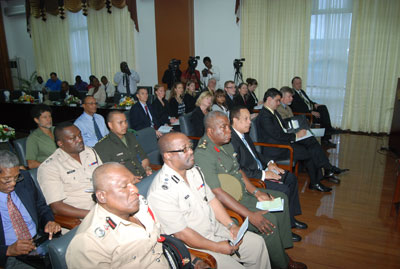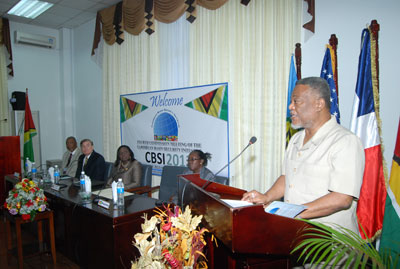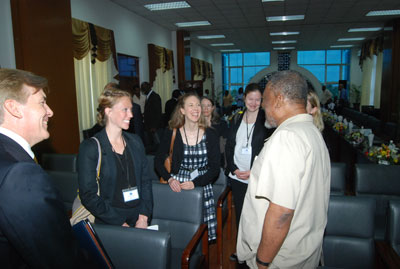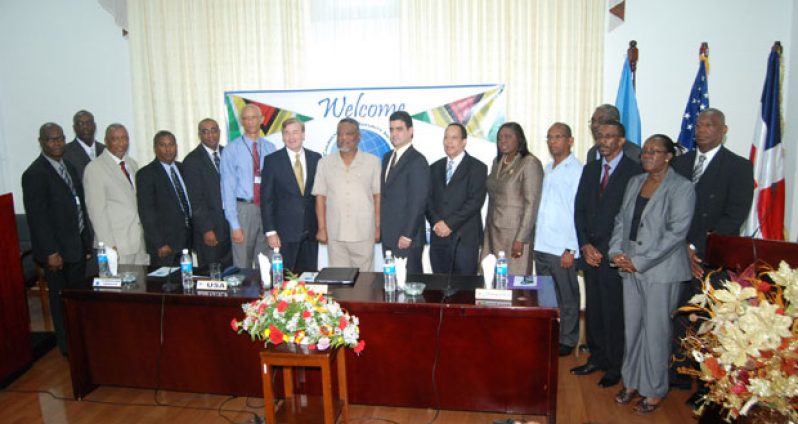CBSI lauded for its work at fourth meeting
– currently under way in Guyana
THE fourth meeting of the Caribbean Basin Security Initiative (CBSI) commission was convened yesterday, at the Guyana International Conference Centre (GICC), Liliendaal, Greater Georgetown.

The aim was to review the progress made under the programme and make recommendations for its effective and sustained implementation.
The CBSI brings together all members of the Caribbean Community (CARICOM) and The Dominican Republic to, jointly, collaborate on regional security with the United States (U.S.) as a partner, committing US$203M in funding for the first three years.
This two-day gathering is to facilitate the preparatory work of the annual high level dialogue, monitoring and evaluating the implementation of the various initiatives identified for cooperation as well as to consider resource mobilisation strategies for sustained engagements on security matters.
Delivering the feature address at the opening, Prime Minister Samuel Hinds, performing the duties of President, said if the region is to continue developing and enhance the well-being of its citizens, then it must, as a matter of necessity, take all steps to reduce crime and improve security in the respective

countries.
According to him, the Government of Guyana is convinced that the crime and security challenges in the Region demand that a holistic strategy should be employed to address them, which requires a collaborative effort, inclusive of the efforts of the international partners.
He emphasised that they are steadfast in the view that the Region has to work together to solve its crime and security problems.
INCREASING PROPENSITY
Hinds highlighted regional issues, such as the increasing propensity of young people to be

involved in crime and deviant behaviour, the proliferation of firearms trafficking and smuggling and the tendency of persons to engage in the use of violence to resolve their differences.
He noted that those issues represent some of the factors that justify the conceptualisation of the CBSI and, if they fail to take action, they will not be able to sustain and grow their economies and prosperity will suffer.
The prime minister declared that the Government’s commitment to the success of the CBSI is without question and this was demonstrated by their immediate acceptance of the offer to host the fourth meeting of the commission this year, although the previous one was also hosted in Guyana in October 2011.
“Guyana supports the roll out of the current CBSI projects in that the focus is holistic. The projects allow us to continue to build the capacities of our law enforcement agencies and, at the same time, a significant portion of the funding under the initiative is being used to deal with issues relating to youth at risk,” he explained.
Hinds said it is the view in Guyana that they must seek to discourage youths from being involved in unproductive pursuits, by guiding them towards a path where they can contribute to the productivity of our societies.
“Concommitantly, we must build the capacities of our police and related agencies to reduce crime and violence in our communities,” he added.
He observed that, in our world today, we have reached a stage in technological development where criminal networking has been taken to a level of sophistication that warrants appropriate law enforcement responses.
Therefore, he said, it is apt that one of the main objectives of the CBSI is capacity building of institutions to effectively combat all forms of crime and the Government also welcomes the emphasis of training through the programmes under the initiative.
He outlined the four pillars on which the programmes of the CBSI are built as law enforcement information sharing, law enforcement cooperation and capacity building, crime prevention by focusing on youths at risk and maritime and aerial domain.
Hinds said the Government is of the view that the programmes under the CBSI have been properly conceptualised and the outcomes of the implemented projects will benefit all involved.
He said they are also appreciative of the efforts being spearheaded by the U.S. government, with assistance from the Government of Canada and other partnering countries and international organisations to provide support, in a tangible way, to countries of the Caribbean Region in addressing crime and security in our countries.
BUILDING PARTNERSHIPS
He posited that the highlight of this collaboration is the concept of building partnerships
“Our economies are, in some instances, thin and fragile, thus we must be in a position to create the right security related cognitions to encourage investment in our region,” he said.
In his view, it is necessary to engage in the monitoring, evaluation and reviews of the various programmes in order to ensure that the objectives set are being met and, if they are not, how they may be adjusted.
Consequently, he said, in each of the countries they should consider the creation of in-country working groups to monitor and provide counsel for the projects that are being undertaken under the CBSI.
He pointed out that the Home Affairs Ministry has established working groups that mirror the four previously mentioned pillars of the CBSI.
TREMENDOUS WAY
Mr Hinds attested that the initiative has aided Guyana in a tremendous way by ensuring that the country implements and monitors the respective CBSI projects in an effective way and ensure that the partnership stays together.
He expressed hope that the deliberations during the two-day conference will assist in strengthening their resolve to work together and make sure that the Region becomes safer and wished them a successful meeting.
Meanwhile, also delivering remarks, Permanent Secretary in the Ministry of National Security in St. Kitts and Nevis, Ms. Astona Browne agreed that the commission has made significant strides in advancing the implementation of mechanisms and projects that are designed to fulfil the stated aims outlined in their plan of action.
“At the first meeting of the high level dialogue in Washington, we pledged to substantially reduce illicit trafficking in our Region, to advance public safety and to further promote social justice,” she recalled.
On behalf of the CARICOM member States and the representatives from The Dominican Republic, she expressed pleasure in meeting with their principal partner, the U.S., which is making sure the successful implementation of this cooperation agreement.
Browne said they are focused on areas that are to inform the work of the commission, which continues to serve as the guiding principles, but there is yet much to be done.
She stated that, even as they endeavour to draw on their limited resources and seek to confront the global security challenges, they are mindful that there are challenges, such as firearms related crime, which have a strong nexus with drug trafficking and the perpetration of crime and violence by youth, especially in some communities.
She added that, in the partnership, their crime prevention and detection initiatives must be informed by the priorities that are encapsulated in the strategic goals of the Region’s crime and security strategy, which continue to guide their policy decisions.
PHENOMENAL PROGRESS
“None will question the phenomenal progress that could be made when we embrace what is being referred to as that new, more pragmatic and implementable approach to this security initiative,” she contended.
She said CARICOM member States have embraced that new paradigm and are focused on securing our waters, borders, community, people and nations as a whole.
Browne emphasised that, with the committed involvement of all actors at the national, regional and international levels, they will continue to realise measured accomplishments, especially in building capacity in areas such as information sharing and criminal investigation using forensics and related advanced technology.
She said they will, therefore, continue to operate on the premise of mutual respect and shared responsibility in this new era of strategic engagement that has been institutionalised as part of a more pragmatic approach to an enhanced safety and security cooperation.
“Notwithstanding our setbacks and our challenges, we will persist; we must persist with the strengthening of the regional framework, the management of the crime and security agenda in the community, working collaboratively with our colleagues from The Dominican Republic and the United States of America, as well as State and non-State actors for the common good,” she asserted.
Browne informed that the meeting is geared towards consideration of the update on the outcome of the technical working groups and the projections for the sustained work of the agencies, as well as to finalise the agenda for their high level dialogue this year.
She expressed her appreciation to the Government of Guyana for the warm hospitality which was extended to all the delegations and thanked the country for agreeing to host the forum.
She also took the opportunity to record appreciation to the Government and people of the U.S. for the years of strengthened cooperation and partnership that they share on security matters.
TRADITIONAL ALLIES
Additionally, she recognised the commitment of other traditional allies, such as the Government of Canada, United Kingdom (UK), France and the European Union (EU).
U.S. Ambassador to Guyana, Mr. Brent Hardt, in his remarks, indicated that the CBSI has emerged as a genuine partnership among 14 nations, each bearing responsibility for ensuring progress toward their collective goals and objectives.
“From the onset, CBSI has been conceived and developed as a shared security partnership among the countries of CARICOM, The Dominican Republic, and the United States – a partnership that seeks to meet the various threats arising from increasing crime and violence throughout the region,” he acknowledged.
The diplomat said that these threats, with both internal and external origins, have been fuelled by drug and other illicit trafficking that affect the safety of both Caribbean and U.S. citizens.
He said it is vital that the CBSI succeed in achieving its goals, so there is no sub-region seen as hospitable for drug and other illicit trafficking flows.
Hardt also underscored the role that the CBSI plays in providing a vehicle through which nations throughout the world with interests in the Caribbean can coordinate their regional activities with the partner nations to foster more efficient multilateral efforts.
He emphasised that, in this regard, they welcome the active engagement of their Canadian, British, European Union, UK, Dutch and other partners who are making valuable contributions to the region’s security.
The ambassador informed that, in the past year, throughout the region, the CBSI partners convened three technical working groups on law enforcement and anti-corruption, crime prevention, and maritime domain awareness.
“These technical working groups have facilitated a constructive dialogue among CBSI partner nations that has allowed us to coordinate local, national, and regional security and crime prevention activities, policies and priorities,” he reported.
According to him, they have proven invaluable as a vehicle to inform their programming and funding under CBSI and it is their goal and hope that they served to refine and improve the individual and regional security efforts of all partners, as well as those other international donors with interest in the region.
AN OPPORTUNITY
Hardt remarked that the fourth meeting of the CBSI commission provides the partnership with an opportunity to celebrate their collective accomplishments to date, review the hard work presented to the commission as part of a joint implementation report prepared by CARICOM IMPACS, the U.S. and The Dominican Republic, among other things.
“We look forward, over the next two days, to a vigorous exchange of ideas that can integrate the efforts of the working groups to chart a clear path forward for implementation of the programmes and achievement of the goals we have jointly developed,” he stated.
He also said he hopes that, at the end of the forum, all participants will be able to return home with a renewed commitment to the CBSI partnership and renewed belief that they can, together, enhance the safety and security of their citizens through cooperation, creativity, and perseverance.
Hardt also took the opportunity to offer heartfelt thanks to the Government of Guyana for playing host and for their generous hospitality, which is one of the hallmarks of Guyana and its people.
He extended gratitude, as well, to their CARICOM colleagues, especially at the Implementation Agency for Crime and Security (IMPACS), for their support in the coordinating.
Among those present at the opening were Army Chief-of-Staff Brigadier Mark Phillips, Police Commissioner Leroy Brumell and Fire Chief Marlon Gentle.
(By Chriseana Ramrekha)



.jpg)








